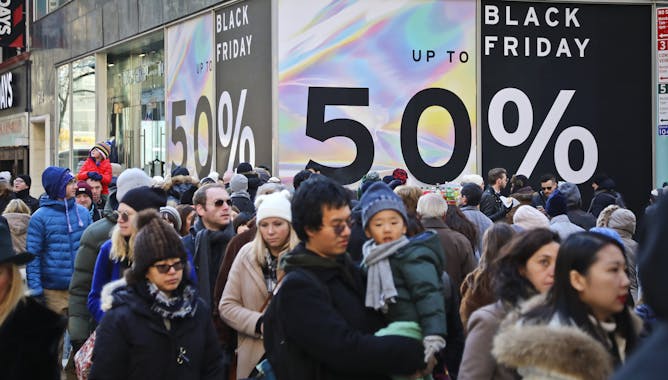|
Money worries are rising for people around the world. Whether it’s holiday shoppers planning purchases, or workers striking for better pay and conditions, signs of the rising cost of living are rife in many countries.
Consumers in the U.S. are cutting back “as a combination of soaring consumer prices, rising borrowing costs and growing odds of a recession weighs on their wallets,” according to recent research by academics from Michigan State University. A survey they conducted a week before holiday shopping season tends to kick off in the U.S. shows people are already behaving as if in an economic crisis akin to the Great Recession.
In another sign of belt-tightening, a different poll shows 60% of Britons also plan to spend less on Christmas this year. Such behavior won’t help the many U.K. retailers that are experiencing difficulties right now. Several major retail brands have already collapsed in recent months. This article from a legal expert at Lancaster University explains what happens when a company runs into such difficulties by charting the rise and fall over just 18 months of a British “pandemic-era business superstar.”
|

Ayalla A. Ruvio, Michigan State University; Forrest Morgeson, Michigan State University
A new survey suggests three ways consumers are behaving like the US economy is in crisis, which may become a self-fulfilling prophecy.
|
Quote of the week 💬
|
-
“While the U.S. was the focus of our solar subsidy research, this way of thinking – balancing the costs and benefits of subsidies – can be applied in other nations to design better subsidies for clean energy technologies.”
– Eric Hittinger, Eric Williams, Qing Miao and Tiruwork B. Tibebu of Rochester Institute of Technology from their story How to design clean energy subsidies that work – without wasting money on free riders
|
|
|
|
Business
|
-
Libby (Elizabeth) Sander, Bond University
Change management never quite goes according to plan. But it’s hard to figure out if Elon Musk even has a plan.
|
|
Inequality
|
-
Alper Kara, University of Huddersfield
Female managers and board members have a positive effect on company performance and the environment.
|
|
Workers
|
-
Heather Connolly, Grenoble École de Management (GEM)
University staff to walk out for three days in what may be the largest ever in the higher education sector.
-
Nancy Marie Ross, Dalhousie University; Raluca Bejan, Dalhousie University; Steph Zubriski, Dalhousie University
Education strikes by university and public school workers are political fights about diminished respect for education as a public good and workers’ rights in an economy that perpetuates inequality.
|
|